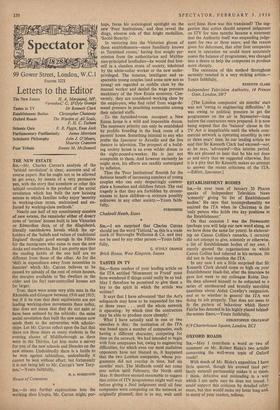SIR,—In any further explorations into the working class Utopia, Mr.
Curran might, per-
haps, focus his sociological spotlight on the new 'Poor Institutions,' and thus reveal the dingy, obverse side of that bright medallion, 'Social Security.'
In venturing into the Victorian gloom of these establishments—more familiarly known as 'furnished rooms,' having first sought per- mission from the authoritarian and Malthu- sian-principled landladies—he would find him- self in a classless strata of society, inhabited by the white-collar worker or the new under- privileged. The inmates, intelligent and re- spectable young couples (and some now not so young) are regarded as middle class by the manual worker and denied the wage pressure machinery of the New Estate economy. Con- versely, they are considered working class by the employers, who find relief from wage-de- mand pressure in practising economies among their salaried staffs.
To the furnished-room occupant a New Estate home is a wild and impossible dream. The necessary priority can only be established by prolific breeding in the back room of a parents' house. Something inimical to any who prefer the Spectator to Reveille and the live theatre to television. The prospect of a build- ing society house is an even wilder dream to the eight-pound-a-weeker. He is just not acceptable to them. And however earnestly he might save, his efforts are readily outstripped by inflation.
Thus the 'Poor Institutions' flourish for the dubious benefit of increasing numbers of young couples who can only despairingly contem- plate a homeless and childless future. The real tragedy is that they are forbidden by circum- stances to have children—a stricture possibly unknown in any other society.—Yours faith- fully, Chadwell Heath, Essex
FURNISHED


































 Previous page
Previous page